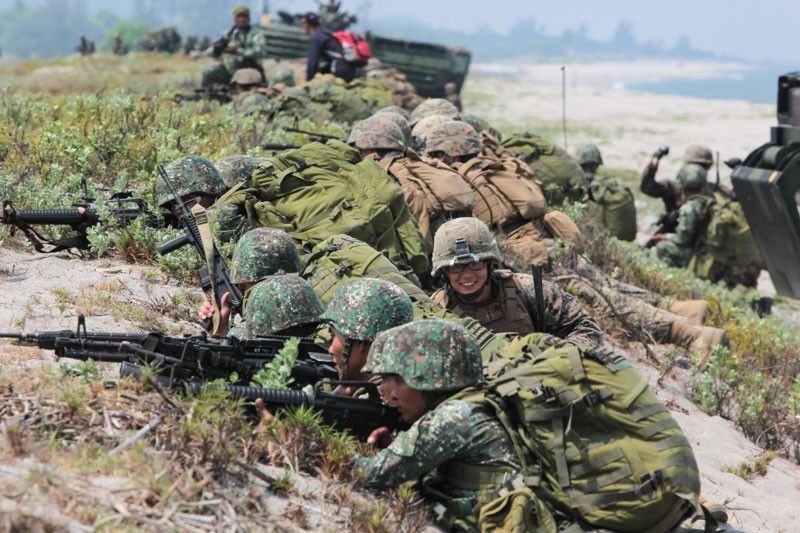Duterte says VFA up for renegotiation

MANILA, Philippines — The Visiting Forces Agreement (VFA) between the Philippines and the US is up for renegotiation, President Rodrigo Duterte said, as he maintained that his administration has veered away from a pro-West foreign policy to avoid "trouble."
During a meeting of the government's pandemic task force last Monday, former senate president Juan Ponce Enrile, who was invited by Duterte to talk about the West Philippine Sea row, noted that he had voted against the lease extension of US bases in the Philippines during the time of the late president Corazon Aquino.
Duterte then claimed that the US has substituted the lease deal with the VFA, a 1998 deal that allows Filipino and American troops to conduct joint exercises in Philippine soil.
"It’s up for renegotiation and that power belongs to the president. I should have an idea hearing from you (Enrile) what I should do," the president said.
"So I would like to just study very carefully the advent or with the coming of the renegotiation of the Visiting Forces Agreement. Something has got to give," he added.
Last year, Duterte announced that he is scrapping the VFA after the US had canceled the visa of his political ally Sen. Ronald dela Rosa, one of the key personalities in the Philippines' controversial war on illegal drugs. Malacañang said the other reasons that prompted Duterte to abrogate the deal are the US Senate resolution condemning the alleged human rights violations in the Philippines; the call of some American lawmakers to free detained opposition Sen. Leila de Lima, and the US travel ban against those who are behind her detention.
Despite Duterte's tirades against the VFA, he has postponed the termination of the pact twice. He suspended its abrogation in June and extended the deferment of the termination for another six months last November.
Last February, Duterte said the US should "pay" the Philippines if it wants to keep the VFA, arguing that the presence of American facilities would make Manila vulnerable if a conflict involving Washington erupts. He later on promised to listen to the views of the public before deciding whether to junk the VFA.
Duterte said former American president Donald Trump had invited him to the US several times but he refused.
"President Trump invited me several times but I said, 'for as long as you treat us like...you know...something which is an inferior... You are treating us like your detachment. You are making the Philippines a sort of...an early warning device detachment...And I said this cannot happen during my time," the President said.
Neutral policy
Duterte also justified his decision to distance himself from western countries like the US, the Philippines' traditional ally.
"In the early days of my administration, I announced a change of the direction of our foreign policy from being pro-Western to just neutral, just playing it safe in the meantime because...there might be really a trouble brewing. So I stayed in the middle," the President said.
Duterte warned that the next war would be fought using nucelar weapons and reiterated that the Philippines cannot afford to have a conflict with China.
"If it is a war against big powers, it will be a nuclear war, and it will reduce this planet into a dry land," he said.
Enrile, who served as defense minister during the time of the late president Ferdinand Marcos, said the US cannot be expected to help the Philippines on the "nitty gritty" of the West Philippine Sea dispute.
"Although if you talk to the officials of America, they would tell you, 'We will help you. We will protect you. We'll come to your rescue.' But when the nitty-gritty is there, you cannot rely on them," Enrile said.
Enrile said the Philippines should talk to the US to amend the Mutual Defense Treaty (MDT) so that there would be an "automatic action" in case Manila encounters a problem with other countries. The former senator, however, believes that the US would not agree with such an amendment.
Enrile also claimed that the MDT, the 1951 treaty that allows the Philippines and the US to cooperate with each other against possible external attacks, does not cover the West Philippine Sea dispute.
"If you read the Mutual Defense Treaty, you would see that our agreement with America only covers attacks against our fighter planes or our war ships in the Pacific. But when we were discussing the amendment to the military bases agreement... they said the West Philippine Sea or South China Sea is not part of the treaty area of the Mutual Defense Treaty," Enrile said.
"If something happens in the West Philippine Sea between China and the Philippines, we cannot use the Mutual Defense Treaty," he added.
- Latest
- Trending


























